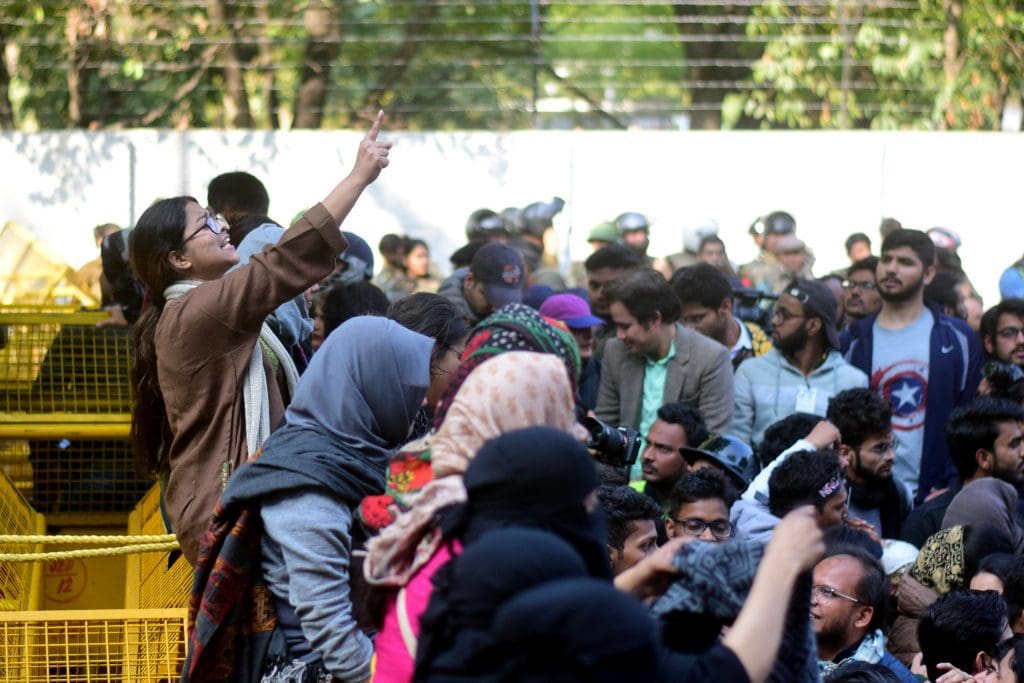
Adv. Nabila Hasan
The contrasting fate of two individuals one BJP leader whose communal and inciting speeches culminated into the killing of 58, 38 of them Muslim, till date no charges have been filed against him, while on the other hand Safoora Zargar, over 5 months pregnant and currently languishing in Jail from the last 60 days. She has been booked under frivolous and baseless FIR under the draconian Unlawful Activities (Prevention) Act (UAPA). This Act has been weaponized to trample the voice of dissent of the youth of many like Safoora who are exercising the Fundament Right enshrined under Article 19 (1) (a) of the Constitution. It is pertinent to note that Section 35 of the UAPA gives the arbitrary power to the Central Government to categorize any individual as ‘Terrorist’ and add the name of such person in Schedule 4 of the Act which is absolutely against Article 14 of the Constitution of India.
On 10 April, Safoora was arrested during her first trimester of pregnancy by Special Cell of Delhi Police in First Information Report (FIR) 49/20 registered at Jaffrabad police station, Delhi, pertains to offenses which are bailable. On 13 April, Metropolitan Magistrate granted her bail considering “her pregnancy, health condition, and the directives issued by the Indian Supreme Court on decongestion of prisons during COVID-19.”
Later, the Crime branch at the behest of the Indian government illegally curtailed her freedom to be released on bail and re-arrested her in second FIR 59/2020, added the heinous offenses and invoked anti-terror laws against her. Moreover, FIR 59/2020, the audaciously claimed to have provided the narrative of ‘conspiracy’ behind the violence in northeast Delhi between 23 and 28 February 2020. The granting of bail under Section 43 (D) subsection 5 of the UAPA becomes nigh impossible even if there is no clear evidence against the person. However, the jurisprudence of law makes bail as a rule and Jail as an exceptional. But, Zargar’s appeal for bail, on both the occasion by the Trial Court of Delhi vide orders dated 21.04.2020 and 04.06.2020 were arbitrary and unjustly denied.
The Additional Session Judge while denying her bail in the order dated 15 June, stated, “even if no direct violence is attributable to the applicant, she cannot shy away from her liability under the provisions of the act. When you choose to play with ember, you cannot blame the wind to have carried the spark a bit too far and spread the fire.”
The Learned Judge while denying bail has turned a blind eye to the misery and completely ignored the humanitarian ground of the medical condition of Safoora, who is suffering from Poly Cystic Ovarian Disorder (PCOD) and Urinary Tract Infection (UTI). Her condition has indeed made her more vulnerable to the risk of Covid-19 and it also raises questions on the state’s apathy and inhuman nature in putting her and her child’s life at risk due to false accusations.
The learned judge further failed to understand the registration of the second FIR 59/2020 upon the very same fact of FIR 49/202 is in violation of the judgment of the Supreme Court in TT Antony versus State of Kerala (2001) 6 SCC 181. The Learned Judge also wrongly relied upon the provisions of Section 43 (D) Subsection 5, which raises the statutory embargo upon the power of the court to grant bail, even if there is a prima facie case, but the embargo is applicable to those which deal with offenses related to “terrorist activities” or “member of a terrorist organization” under Chapter IV and VI of the UAPA.
The mere incident of “unlawful activities” assuming the court’s reasoning correct for a moment or being merely present on the site or “Chakka Jam” i.e road blockage does not attract Section 43 D (5) UAPA. The Court failed to explain in the order that how this can be extrapolated to the conspiracy behind the Delhi riots or involvement in “Terrorist Activities” or how Safoora has any association with “Terrorist Organisation”. The order does not show how the allegations fall within the ambit of Chapter IV and V of UAPA.
The order of the Trial Court leaves many questions, whether blocking road can be equated with terrorist activities? Whether a pregnant woman who has no prima facie evidence against her can be kept in the detention? Whether mere delivering of speech will lead an individual booked under Sedition and UAPA?
It is pertinent to mention that the arrest of Safoora is not only in violation of the fundamental rights guaranteed in the Indian Constitution but also against various rights guaranteed by the International Human Rights laws such as Article 7,9, 17, 21, 19 of the International Covenant on Civil and Political Rights and in contravention of the United Nation Declaration on the right and responsibility of individuals and groups of society to promote and protect the Human rights fundamental freedom of the individual.
Regardless of whether Safoora’s arrest was proper and justified under the normal circumstances, the State erred in not complying with United Nation Rules for Treatment of Women Prisoner’s and Non Custodial measures for the women offender (also known as Bangkok Rules) which restricts to keep pregnant women during the pre-trial phases wherever that is possible or appropriate. Thus, the denial of bail is not only faulty on the factual grounds but also the court has failed to preserve the principle of a right to live with dignity enshrined under Article 21 of the Constitution.
Nabila Hasan is a practicing advocate based in Delhi and works for Human Rights Law Network (HRLN).



